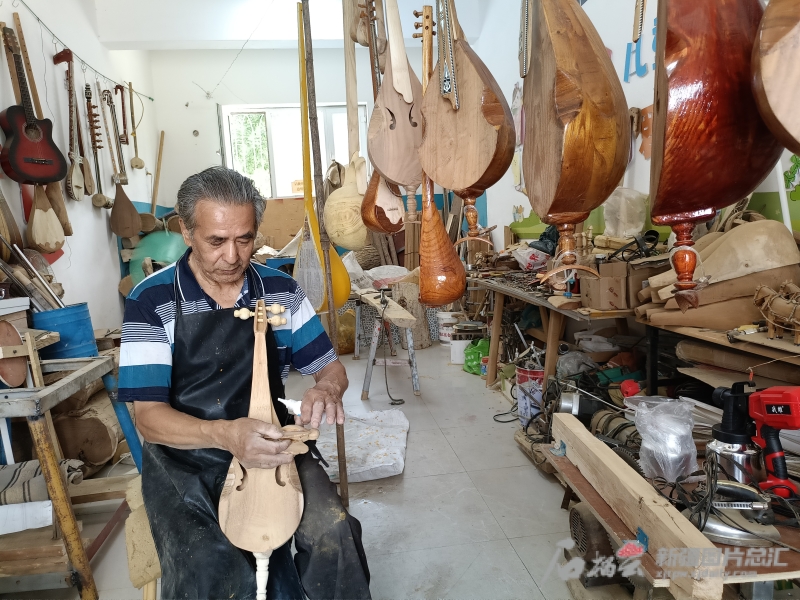Correspondent: Yang Liuqing
In the Tengfei Community of Tiekeqi Township, Korla City, there is such a studio, where not only large pieces of wood are stacked, but also cutting machine and workbenches are placed.
The owner of the studio, Ali Mahsum, is a retired teacher and and is nearly 70 years old. In his skillful hands, the wood will be transformed into various ethnic musical instruments - satar, tambur, rawap, gijak, etc.. These musical instruments are exquisitely made, and are decorated with intricate and beautiful patterns of ethnic craft characteristics.

Photo shows Ali Mahsum makes musical instruments at his studio. (Photo by Yang Liuqing)
When I met Ali on June 13, he was carving out the body of an instrument from a whole piece of mulberry wood. After that, he would make accessories, do painting work and attach strings, all of which would be done by hand. Many musical instruments also have a beautiful wooden bird carved on the top, which makes them beautiful and gives them collection values. These instruments not only are elegant in appearance, but also have very beautiful sounds in timbre.
Ali's studio is nearly 20 square meters and is fully utilized. There are stacking areas, workbenches, and display areas, and all kinds of musical instruments are hung on the walls. A wire is drawn in the middle of the studio, hanging semi-finished instruments. According to rough estimates, there are more than 20 varieties and nearly 100 musical instruments.
It is hard to imagine that Ali taught himself the craft of making musical instruments two years ago by studying online and finding information, measuring the size of each components of various musical instruments, and exploring step by step. Take rawap as an example, now Ali is very skilled at making it. He works 8 hours a day and can finish a rawap in two weeks. The basic version of a rawap is only sold for more than 300 yuan, but the price of materials and labor is far higher than the price. Then why does he do this?
It turns out that the price of ethnic musical instruments is very high, and even though many people like playing musical instruments, they are frustrated by the price. Ali wants to make ethnic musical instruments that everyone can afford. "Families and friends get together to play musical instruments, singing and dancing. What a happy life! So, making musical instruments affordable for everyone is my goal," said Ali.
There is another thing that motivates Ali to achieve his dream. In September 2021, Ali used sandpaper sanding the accessories of musical instruments downstairs because of the dust. Du Xiumei, the first secretary of Tengfei Community, happened to see him and after knowing the reason why he made ethnic musical instruments, she asked him if the community provided him a studio with free water and electricity, would he be willing to move to the community studio?
"I was so happy! Making instruments at home will make the house very dusty, which affects my family’s livings. There is no place to stack wood, and making musical instruments outdoors has many limitations. With a studio, I can accomplish my goals and bring wonderful music to more people!" Ali said.
In September of that year, Tengfei Community Handmade Studio was officially opened.
Ali said: “After the establishment of the studio, my neighbors and friends always like to come here. Everyone plays musical instruments and sings cheerful songs. Anyone could choose whatever musical instrument they like and take it home to play and see if it suits. And If it doesn’t suit, they can take it back without paying money first. Making musical instruments is all about making people happy.”
Du Xiumei said that ethnic musical instruments have unique appearances, exquisite decorations, excellent sound quality and strong ethnic characteristics. There is such a talented and thoughtful resident in the community, the community would make every effort to help, and let more people fall in love with ethnic musical instruments and let them play out the good life.
Ali took out a large pile of documents that he had flipped through many times, and said that his dream is in this studio and in the detailed production drawings of instruments. In the future, he will also make morin khuur, pipa, flute, and guitar. His greatest wish is to make music accompany the good life of today.
(A written permission shall be obtained for reprinting, excerpting, copying and mirroring of the contents published on this website. Unauthorized aforementioned act shall be deemed an infringement, of which the actor shall be held accountable under the law.)









